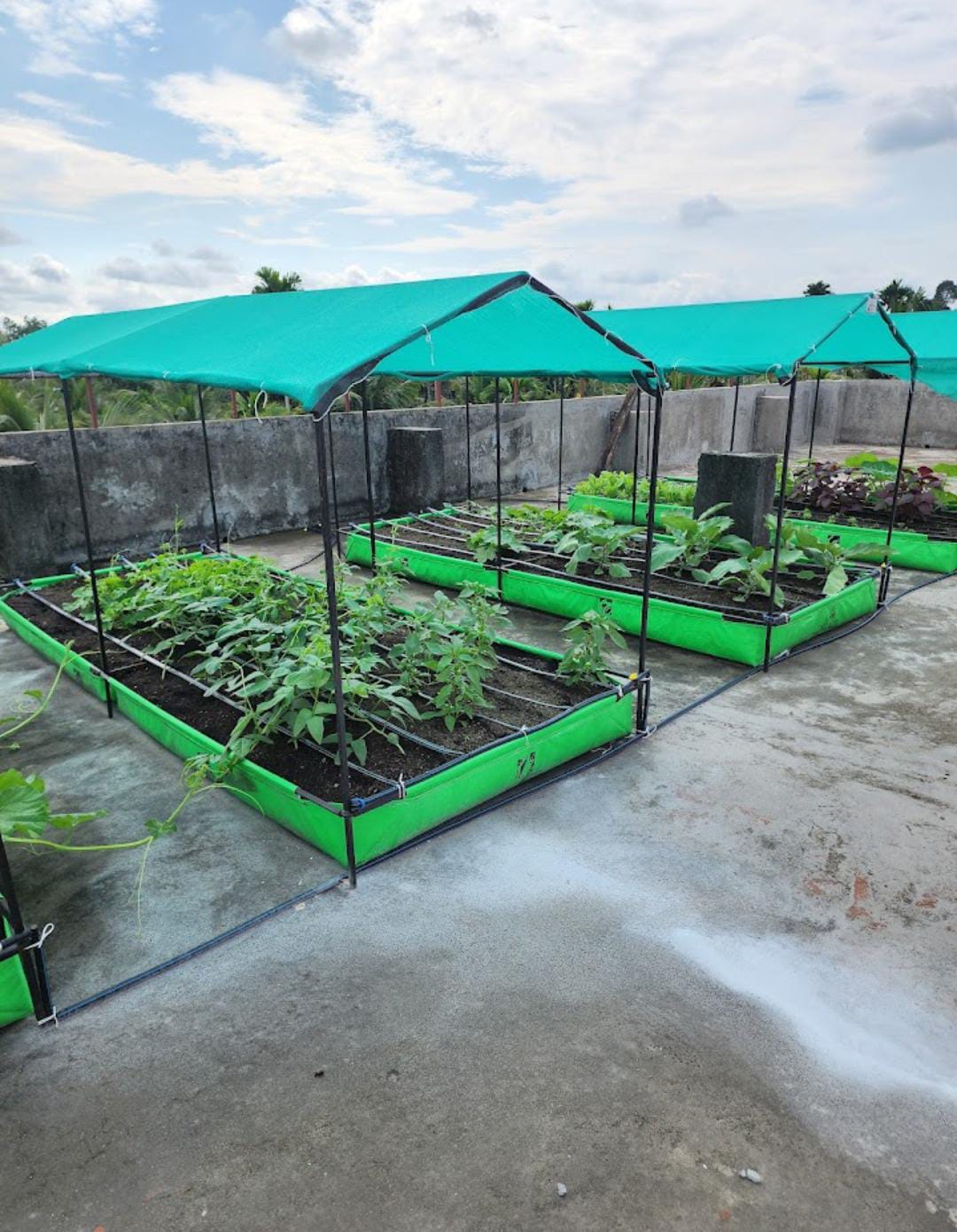Innevotek Agri Solutions
Elamakkara - Ernakulam
Products & Services:
Innevotek Agri Solutions, Elamakkara, Ernakulam, Reviews, Contact number, Phone number, Address, Map More..
Since : 2024
Elamakkara - Ernakulam
Products & Services:
Innevotek Agri Solutions, Elamakkara, Ernakulam, Reviews, Contact number, Phone number, Address, Map More..
Since : 2024
Enriched coco peats are a natural, eco-friendly growing medium used as an alternative to traditional soil for gardening and horticultural purposes. Made from coconut husk, this organic substance has gained popularity due to its ability to retain moisture, promote healthy plant growth, and improve soil aeration. Enriched coco peats are widely available in Ernakulam and are used by both home gardeners and professional landscapers to create lush, sustainable green spaces.
In Ernakulam, where urban gardening and sustainable landscaping are on the rise, enriched coco peats provide a versatile and effective solution for growing plants in a variety of settings. Whether you're setting up a vegetable garden, a hydroponic system, or simply looking to improve the quality of your soil, enriched coco peats offer numerous benefits that enhance plant growth and reduce environmental impact.
· Innevotek Agri Solutions
· Green Leaf Garden
· Floral Garden Care
· Green Heaven Gardening Services
· Eco Gardens
· Nature’s Care Garden Services
· Gardenia Landscaping & Gardening
· Blossom Garden Services
· Royal Green Landscaping
· Green Acres Garden & Landscaping
Coco
peat, also known as coir pith or coir dust, is a natural, versatile, and
eco-friendly byproduct derived from coconut husks. It is widely used in
agriculture, gardening, and horticulture as a soil amendment due to its
excellent water retention, aeration, and nutrient absorption properties. Coco
peat has gained popularity as a sustainable alternative to traditional soil in
various farming applications, particularly in soilless agriculture and organic
gardening.
In this
guide, we will explore coco peat in detail, with a focus on Enriched Coco
Peat and its various uses, benefits, and applications. Additionally, we
will answer frequently asked questions to provide a clearer understanding of
coco peat.
1. Water Retention
Coco peat
has excellent water retention capacity, capable of holding water 8-10 times its
weight. This helps keep the soil moist for longer periods, reducing the
frequency of watering.
2. Improved Soil Aeration
The
fibrous structure of coco peat improves soil aeration, which promotes healthy
root growth and prevents soil compaction. This allows for better oxygen flow to
the roots, enhancing plant development.
3. Eco-Friendly and Sustainable
Coco peat
is a renewable resource, making it an eco-friendly alternative to peat moss.
Its use helps reduce environmental impact, as coconut husks are often
considered waste products.
4. pH Neutral
Coco peat
has a pH level between 5.5 and 6.8, which is neutral to slightly acidic. This
range is ideal for most plants, as it allows them to absorb essential nutrients
more effectively.
5. Disease-Resistant
Coco peat
naturally resists harmful soil pathogens and diseases, creating a healthier
environment for plant growth.
6. Biodegradable and Reusable
Coco peat
is biodegradable, meaning it can break down naturally over time. It can also be
reused for multiple planting seasons, further reducing waste.
Uses of Coco Peat
1. Soil Amendment
Coco peat
can be mixed with garden soil to improve its structure, water retention, and
nutrient availability. It loosens compacted soil, making it easier for roots to
grow and absorb water and nutrients.
2. Hydroponics Growing Medium
Coco peat
is an excellent medium for hydroponic systems, where plants are grown without
soil. It provides a stable foundation for plant roots while retaining water and
nutrients, ensuring optimal growth in a soilless environment.
3. Potting Mix Ingredient
Coco peat
is often used in potting mixes, combined with other materials like perlite or
vermiculite. This mix helps create a well-balanced growing medium that supports
root growth, retains moisture, and drains excess water.
4. Seed Starting
Coco peat
is ideal for seed starting, as its fine texture encourages strong germination.
It provides the right amount of moisture for seeds to sprout, and its light
structure allows for easy root penetration.
5. Mulching
Coco peat
can be used as mulch around plants to conserve moisture, prevent weed growth,
and regulate soil temperature. It decomposes slowly, providing long-lasting
protection for your plants.
6. Vermicomposting Bedding
Coco peat
can serve as a bedding material for vermicomposting. It provides a hospitable
environment for earthworms, aiding in the decomposition of organic matter and
the production of nutrient-rich compost.
How to Use Coco Peat
Preparing Coco Peat for Use
Coco peat
often comes in compressed blocks or bricks, and it needs to be hydrated before
use. Here's how to prepare it:
Using Coco Peat in Gardening
Disadvantages of Coco Peat
1. Salt Content
Some coco
peat products may contain higher levels of salts, which can be harmful to
sensitive plants. It's important to rinse the coco peat thoroughly before use,
especially when using it for hydroponics or sensitive crops.
2. Limited Nutrient Content
While
coco peat has some natural nutrients, it does not provide all the essential
nutrients plants need for growth. You'll need to supplement it with organic
fertilizers or nutrient-rich compost.
3. Initial Cost
Although
coco peat is reusable and sustainable, the initial cost of purchasing
high-quality coco peat products can be higher compared to traditional soil
amendments.
Enriched
coco peat refers
to coco peat that has been fortified with additional nutrients, fertilizers, or
organic matter to enhance its quality and effectiveness as a growing medium.
While regular coco peat provides good water retention and aeration, enriched
coco peat offers a nutrient-rich environment that promotes faster and healthier
plant growth.
Benefits of Enriched Coco Peat:
Applications of Enriched Coco Peat:
1. What is coco peat made of?
Coco peat
is made from the fibrous husk of coconuts. It is a natural byproduct of the
coconut industry, obtained after extracting coir fiber from the coconut shell.
The remaining dust and small fibers are processed into coco peat, which is then
used as a growing medium.
2. What is the difference between coco peat and
enriched coco peat?
Regular
coco peat is untreated and mainly used for its moisture retention and aeration
properties. Enriched coco peat, on the other hand, is mixed with added
nutrients such as nitrogen, phosphorus, and potassium, making it a more
nutrient-dense growing medium suitable for a wider range of plants.
3. Can I use coco peat as a substitute for soil?
Yes, coco
peat can be used as a substitute for soil in various applications such as
hydroponics, container gardening, and seed starting. However, coco peat alone
does not provide all the necessary nutrients for plant growth. Therefore, using
enriched coco peat or adding fertilizers is recommended for long-term plant
health.
4. How do I prepare coco peat for use in gardening?
To
prepare coco peat for gardening:
5. Is coco peat suitable for all plants?
Coco peat
is suitable for a wide variety of plants, including vegetables, herbs, flowers,
and ornamental plants. Its neutral pH and excellent water retention make it
ideal for most plant types. However, certain plants may require specific
nutrient supplementation, which can be addressed by using enriched coco peat or
applying organic fertilizers.

Ernakulam, Elamakkara

Ernakulam, Elamakkara